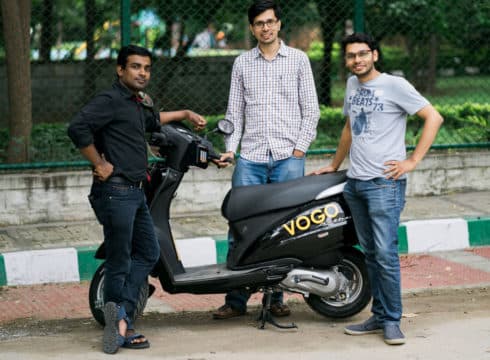This is Alteria Capital's second investment in Vogo
Vogo is also backed by Ola, Kalaari Capital and Matrix Partners
As part of deal Alteria Capital to put in INR 25 Cr, had invested INR 8 Cr in October
Inc42 Daily Brief
Stay Ahead With Daily News & Analysis on India’s Tech & Startup Economy
Alteria Capital, which claims to be India’s largest venture debt fund, has invested $3.6 Mn (INR 25 Cr) in Ola-backed scooter sharing app Vogo, in what is a continuation of growing investor interest in India’s micro mobility space.
This is Alteria’s second investment in the Bengaluru-based startup after it had earlier participated in the Series A with a $1 Mn (INR 8 Cr) investment.
Commenting on the current investment, Vinod Murali, managing partner at Alteria Capital said “We have seen the rapid growth in this segment over the last 9-12 months and Vogo has consistently surpassed expectations on operating performance and driving demand.”
Vogo, founded in 2016 by Anand Ayyadurai, Padmanabhan Balakrishnan, and Sanchit Mitta, offers commuters round-the-clock scooter rentals. The company positions itself as a cost-effective alternative to cabs and autos for short distances.
“We are thrilled to double down on our partnership with Alteria. Since they first came onboard, we have grown over 70X and will leverage this investment to keep growing rapidly and bring Vogo scooters to millions of customers across India,” said Anand Ayyadurai, CEO of Vogo.
Vogo On The Move
Vogo, whose primarily rival in the micro-mobility space is Yulu, has raised funding five times in less than a year with the likes of Ola coming on board as strategic partners.
Started in 2017, Vogo claims to be operational across more than 500 points in five cities in India and has over 3 Mn completed trips on its platform.
It boasts notable investors such as Matrix Partners, Kalaari Capital, Stellaris Venture Partners, ride-hailing major OLA and Pawan Munjal of Hero Motocorp.
In December 2018, Ola had entered into a strategic partnership to invest $100 Mn (INR 712 Cr) in Vogo. Ola had also previously invested in Vogo as part of the company’s Series A funding round which also saw participation from Matrix Partners India and Stellaris Venture Partners. As part of the strategic partnership, Ola had stated it wanted to help Vogo add at least 100K new scooters.
Yulu, also founded in 2017 and based in Bengaluru, is led by Amit Gupta who is also the cofounder of InMobi, which holds the record of being India’s first unicorn.
Unlike Vogo, Yulu also offers bicycles for rent and has a partnership with Uber through which users can be redirected to the Yulu page to make scooter and cycle bookings. It recently introduced the Miracle range of electric scooters in Bengaluru which do not need any registration or driving licence.
Another company in the two-wheeler ride-sharing space is Bounce which recently raised $3 Mn in debt funding from its existing investor InnoVen Capital, a rival to Alteria Capital, in order to increase the number of its vehicle. This too only six months after raising $3 Mn from Innoven.
Alteria Capital Doubles Down On Micro-Mobility
Alteria Capital is a sector agnostic venture debt firm whose investments include Raw Pressery, Toppr, WROGN, Fingerlix, Vinculum and Dunzo.
It remains to be seen if the two-wheeler renting space takes off in the same manner as ride-hailing in India. The question is especially relevant for startups that offer bicycles on rent. Their peers in the West and in China have gone bust after witnessing a funding boom earlier. For example, Yulu began life as a bicycle-sharing platform and but now includes ebikes on its app.
According to a report by Quartz, most of the bike-taxi firms launched in recent years shut shop before turning a year old. This includes Dot, TuWheelz, Rideji, Headlyt, Heybob, and Zingo.
But right now investors in India don’t seem to mind that fact and Alteria’s move of following up on its earlier investment in Vogo is another example of the growing focus on the two-wheeler renting segment by top investors and companies in India.
A recent study by IIT-Delhi found up to 70% of all work-related trips in Indian cities do not exceed five kilometres in length. These distances are typically covered faster and more conveniently on two-wheelers than by using public transport in most Indian cities, perhaps explaining why 79% of all vehicles sold in the country in 2018 were two-wheelers.
According to a report, Indian bike-sharing startups raised around $138 Mn in funding in 2018, compared to just $2 Mn in 2016, which shows the immense investor attention on this sector in the past two years, especially as the ride-hailing market cannot match the affordability of two-wheelers.
Alteria Capital, launched in August 2018, has a total corpus of $123 Mn (INR 800 Cr) for its Alteria Capital India Fund I and a greenshoe option of a further $30 Mn (INR 200 Cr). In May, used car online retailing platform Spinny raised $2.9 Mn (INR 20 Cr) in venture debt from Alteria Capital.
“We launched in August but got our license only in November. From that point, it’s been a very fast-paced effort. We were able to do our first close in 100 days flat and we are currently at about $84.7 Mn (INR 625 Cr) of commitment,” said Murali in an earlier interaction with Inc42 as part of the Moneyball series.
{{#name}}{{name}}{{/name}}{{^name}}-{{/name}}
{{#description}}{{description}}...{{/description}}{{^description}}-{{/description}}
Note: We at Inc42 take our ethics very seriously. More information about it can be found here.


